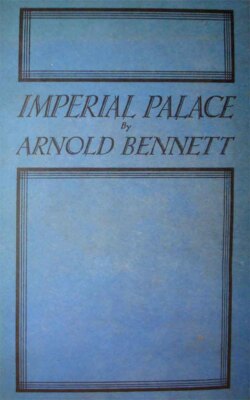Читать книгу Imperial Palace - Arnold Bennett - Страница 51
На сайте Литреса книга снята с продажи.
ОглавлениеIV
Before the room had begun to empty, Mr. Levinsohn came up to the Chairman.
“Good afternoon, Dover,” he said briefly and evenly. “I have another meeting at four o’clock.” He shook hands with father Dennis and with Evelyn, and left, hurrying.
Everybody left. Shareholders could be heard in lively but hushed conversation beyond the open doors at the end of the banqueting-room. Evelyn had glimpses of them taking their hats and coats at the special vestiaire outside. Lingmell departed, with one nod which served for both father Dennis and Evelyn, the thought in his mind being that he had done his duty by the Imperial Palace Hotel Company and was free for a time to devote himself completely to himself. Dacker and Smiss went off at speed, conscientiously to resume at once the round of their important daily work. Mr. Crump gathered together his paraphernalia and, piling it all on the large Register, carried the whole away like a laden tea-tray. Ruffo entered through the service-doors, anxiety on his face. He was responsible for the arrangement of the room for a banquet that evening, and wanted the place to himself and his waiting minions at the earliest possible moment. Nevertheless, seeing Evelyn and father Dennis still together, he disappeared yet again. Evelyn, however, had noticed him and his impatience. Father Dennis and Evelyn had sat side by side without speech. Evelyn slowly tore up his patterned paper into smaller and smaller pieces.
“Rather a lark!” hoarsely murmured Dennis Dover, with a grim, benevolent, humorous smile at Evelyn.
“What?”
“Savott wandering about the hotel while all this has been going on. Eh?” He spluttered laughter and touched Evelyn on the arm.
“He knows by this time,” said Evelyn.
“You may bet your shirt he does!” said the old man, giving another shaking laugh.
Evelyn smiled. He reflected that he had been wrong about old Dennis. Old Dennis was not old. And he was not always cynical in his cheerfulness. There was still a free, impulsive, warm youth in that body so aged, so cumbrous, so unwieldy, and so dilapidated. His bleared eyes gazed into Evelyn’s eyes with quick sympathy. What could it matter to old father Dennis whether or not the Imperial Palace changed ownership? Nothing. Father Dennis had lived beyond such trifles. But it mattered tremendously to Evelyn, and father Dennis’s delight was for Evelyn. He was fondly attached to Evelyn. And Evelyn, realising this exquisite fact anew, felt tears spring to his eyes. He wanted to be by himself—he was so happy, so overcome by the spirit of loving-kindness pouring into him and permeating him from its magic source in the secret and divine place hidden somewhere in father Dennis’s coarse mortal envelope.
They rose and left the room together, and before they had reached the vestiaire, Ruffo and his shirt-sleeved corps had rushingly invaded it, carrying tables. Evelyn put the old gentleman into his vast overcoat, walked down the steps with him to the Queen Anne entrance, and helped him into his car.
“We must have that Board meeting to-morrow to elect our chairman,” said Evelyn as he was closing the door of the car.
“I reminded Lingmell,” squeaked father Dennis. “Noon, isn’t it? But he won’t come. Doesn’t matter. There’ll be a quorum without the old ruffian.” The car moved.
Evelyn strolled to his private office. Dacker, his alter ego in the affairs of the Palace, was standing at the big desk.
“I was just waiting for you, sir.”
“Want anything?”
“No, sir. I thought you might.”
An even increased devotion in his tone. His features were all joyous exhilaration.
“No. Nothing,” said Evelyn. “I’m going to have my tea upstairs. I’ll be down at five again.”
“Yes, sir.” Dacker’s smooth face said: “You are entitled to your retreat on this magnificent occasion. In your absence I shall watch over your interests.”
Evelyn went up in the lift to his home, and telephoned: “Get hold of Oldham, will you, please, and ask him to bring me my tea here. The Darjeeling, tell him. Thanks.”
He dropped into the easiest chair that the works department of the Palace could devise and make. A masterpiece of comfort. He picked up the current number of The Economist, his favourite weekly, and began to read it. A pretence! He did not read it. He was too happy to read, or even to think. He yielded his mind utterly to the sensation of happiness, saying to himself that he had never been so happy, never at any previous moment of all his life. The vista of his life in the future stretched beautifully before him. This kind of happiness had no complications. Nobody had the right to violate his retreat, man or woman. His monarchy was as absolute as that of a sultan—sultan without a purdah. . . .
Oldham softly entered with the tea-tray, which he set on a table by Evelyn’s side.
“I’ve brought you some hot ryvita in case you should fancy it, sir.”
“Thanks, I shall.”
“Thank you, sir.”
Oldham glanced about the ordered room to see that its orderliness was perfect. It was perfect. Then he glanced at his master. Happiness was on Oldham’s face too. Proud happiness, not for himself, but for Evelyn. Oldham knew. They all knew. Probably Oldham did not understand just what had occurred. But he knew that something supremely good for Evelyn had occurred. And his devotion was exalted. Evelyn thought:
“What have I done to win all this loyalty? I don’t deserve it.”
